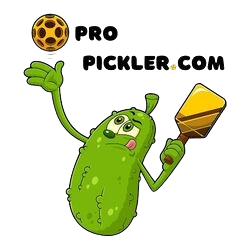The Origins
The captivating story of pickleball traces back to three families: the Pritchards, the Bells, and the McCallums. It all began when Joel Pritchard, a congressman from Washington State, and his friend Bill Bell returned home after a leisurely golf outing. To their surprise, they found their families bored and restless, desperately searching for an activity to engage in. Although the property had an old badminton court, they couldn’t locate a complete set of rackets. Undeterred, they decided to improvise, utilizing ping-pong paddles and a perforated plastic ball.
Initially, their intention was to set up the game for badminton. However, they quickly realized that the net was too high for the paddles and ball they were using. In a stroke of genius, they lowered the net to 36 inches, akin to a tennis net. Thus, the game of pickleball began to evolve, taking on its own unique set of rules and strategies. Interestingly, the game was named “pickleball” not after the brined cucumber, but likely after the Pritchards’ dog, Pickles, who had a penchant for chasing after the ball.
Development and Popularity
During its early years, pickleball remained a cherished backyard game among friends and family. However, as the Pritchards, Bells, and McCallums introduced the game to others, its appeal began to spread like wildfire. By the 1970s, pickleball had permeated schools, YMCAs, and community centers across the United States. The game’s simplicity, coupled with its low-cost setup, made it accessible to individuals of all ages and backgrounds.
A significant milestone in pickleball’s history occurred in 1976 with the inaugural official pickleball tournament held in Tukwila, Washington. This event, organized by David Lester and Joel Pritchard, attracted both amateur and professional players, showcasing the competitive side of pickleball. It also played a pivotal role in standardizing the rules and regulations that govern the game to this day.
The Growth of a Community
The 1980s and 1990s witnessed the establishment of pickleball associations and clubs, which proved instrumental in organizing tournaments, setting official rules, and promoting the sport. One such association, the United States Amateur Pickleball Association (USAPA), was founded in 1984. The USAPA provided a structured framework for the growth and development of pickleball. Through their efforts in organizing tournaments, clinics, and educational programs, the association succeeded in fostering a dedicated community of players.
Pickleball’s popularity soared, particularly among retirees seeking a low-impact activity that would keep them active and socially engaged. The game’s appeal led to the emergence of pickleball hotspots in retirement communities in Florida and Arizona, where large retiree populations reside. The establishment of pickleball courts in residential communities and recreational centers further fueled the sport’s growth.
Modern Day Pickleball
Today, pickleball has transcended borders and become a global phenomenon, captivating millions of players worldwide. The sport is now played in over 60 countries, with national and international governing bodies overseeing its development. The International Federation of Pickleball (IFP) was established with the aim of promoting pickleball globally and standardizing rules across different nations.
Pickleball’s rapid growth can be attributed to its inclusivity and adaptability. The game can be played indoors or outdoors, in singles or doubles format, and is suitable for individuals of all ages and skill levels. The combination of strategic gameplay, quick reflexes, and social interaction has made pickleball a favorite among both recreational and competitive players.
Embracing technological advancements, pickleball has integrated high-quality paddles, balls, and court surfaces to enhance the playing experience. The sport’s presence on social media and streaming platforms has further increased its visibility, attracting a younger demographic and fostering a vibrant online community.
Conclusion
From its humble beginnings as a backyard game to its current status as a global sport, the evolution of pickleball is a testament to its universal appeal. The founders of the game could never have imagined that their impromptu invention would one day become a beloved pastime for millions of people worldwide. As pickleball continues to grow and evolve, it remains a sport that brings people together, fostering community, fitness, and fun.
Remember, whether you’re a seasoned player or new to the game, pickleball offers an inclusive and exciting experience for everyone.
H2: Frequently Asked Questions (FAQ)
Q: What is the origin of the name “pickleball”?
The game was named “pickleball” likely after the Pritchards’ dog, Pickles, who would chase after the ball. 1
Q: When was the first official pickleball tournament held?
The first official pickleball tournament was held in 1976 in Tukwila, Washington. 2
Q: What is the United States Amateur Pickleball Association (USAPA)?
The USAPA is an association founded in 1984 that providesa structured framework for the growth and development of pickleball. They organize tournaments, clinics, and educational programs to promote the sport. 3
Q: How has pickleball gained popularity among retirees?
Pickleball’s low-impact nature has made it an ideal choice for older adults looking to stay active and social. Retirement communities in Florida and Arizona, known for their large retiree populations, have become hotbeds for the sport. 4
Q: What is the International Federation of Pickleball (IFP)?
The IFP was established to promote pickleball globally and standardize rules across different countries. They oversee the development of the sport on a national and international level. 5



